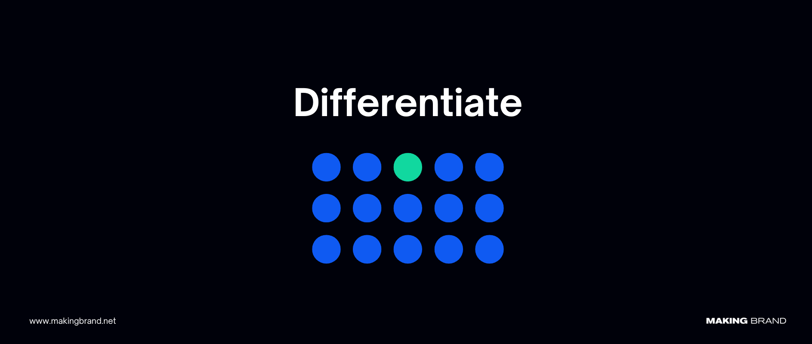How to Differentiate My Business from Competitors?
3 min read


Imagine walking into a bustling marketplace where every stall is selling the same fruit. The air is filled with voices shouting, “Buy from me!” Yet, amidst the noise, one stall catches your eye. Maybe it’s the vibrant display, the friendly vendor, or a unique offering you didn’t expect. That stall? That’s the one you remember.
Your business operates in a similar marketplace—a sea of competitors vying for attention. To thrive, you must stand out, not just for the sake of being different, but to offer something meaningful and memorable to your audience.
Start with Your Why
Differentiation begins with understanding your purpose. Why did you start your business? What drives you beyond profits? Your “why” is the emotional core of your brand, and it resonates deeply with customers when communicated authentically.
Consider brands like Patagonia, whose commitment to sustainability isn’t just a marketing tactic—it’s woven into every decision they make. Their purpose attract loyal customers who share the same values. Find your “why,” and let it guide your business decisions and messaging.
Know Your Audience Intimately
You can’t differentiate if you don’t know who you’re speaking to. Spend time understanding your ideal customer. What are their needs, desires, and pain points?
The better you understand your audience, the more effectively you can tailor your offerings to meet their unique needs. For example, a tech company serving startups might focus on affordability and scalability, while one targeting enterprises might emphasize security and robust support.
Craft a Unique Value Proposition (UVP)
Your UVP is your promise to customers—a clear statement of the unique benefits your product or service delivers. It’s not just about what you do but how you do it differently and better.
To create a compelling UVP:
Focus on the specific problem you solve.
Highlight the benefits that competitors can’t easily replicate.
Communicate it clearly and concisely.
Think of Slack’s UVP: “Be less busy.” It’s simple, relatable, and directly addresses the pain point of workplace inefficiency.
Embrace Innovation
Innovation doesn’t always mean creating something entirely new. Sometimes, it’s about improving what already exists or delivering it in a better way.
For example, Uber didn’t invent taxis, but they revolutionized the experience by making rides more accessible, trackable, and convenient. Look for opportunities to innovate in your industry, whether through technology, customer experience, or service delivery.
Build an Unforgettable Brand
Your brand is more than your logo or tagline—it’s the story, emotions, and experiences people associate with your business. A strong brand creates an emotional connection, making it easier for customers to choose you over competitors.
Focus on:
Consistent messaging across all platforms.
A visual identity that reflects your brand’s personality.
A tone of voice that speaks directly to your audience.
Apple, for instance, has mastered the art of branding. Their clean design, minimalist messaging, and focus on user experience make them instantly recognizable.
Deliver Exceptional Customer Experience
In today’s world, customer experience is as important as the product or service itself. People remember how you make them feel, and a positive experience can turn a one-time buyer into a lifelong advocate.
Ways to enhance customer experience:
Be responsive and attentive to customer needs.
Go the extra mile to exceed expectations.
Seek feedback and continuously improve.
Zappos, an online shoe retailer, is legendary for its customer service. Their willingness to go above and beyond has earned them a fiercely loyal customer base.
Leverage Storytelling
Stories have the power to humanize your brand and make it relatable. Share your journey, the challenges you’ve overcome, and the values you stand for.
A well-told story can differentiate your business by making it memorable. For instance, TOMS Shoes shares the story of how every purchase helps provide shoes to someone in need. This narrative resonates deeply with their audience and sets them apart.
Focus on Niche Expertise
Instead of trying to be everything to everyone, specialize in a niche. Being an expert in a specific area allows you to dominate that space and attract a loyal customer base.
For example, a tech consultancy specializing in AI for healthcare will stand out more than a generalist IT firm. By focusing on a niche, you position yourself as the go-to expert.
Stay True to Your Values
Authenticity is a powerful differentiator. Customers are drawn to businesses that stay true to their values, even when it’s not the easiest path.
For instance, Ben & Jerry’s has built a brand around social activism. Their commitment to environmental and social causes makes them stand out in the competitive ice cream market.
Outshine Competitors with Consistency
Finally, differentiation isn’t a one-time effort—it’s a long-term commitment. Stay consistent in your messaging, branding, and customer interactions. Over time, this consistency builds trust and loyalty, setting you apart from competitors who may falter.
In Conclusion
Differentiation is about more than standing out—it’s about creating genuine value and connecting with your audience on a deeper level. By understanding your purpose, knowing your audience, and delivering exceptional experiences, you can carve out a unique space in your industry.
The marketplace may be crowded, but with the right strategies, your business can be the one that stands out, attracts loyal customers, and thrives in the long run. So, what will you do today to set your business apart?
